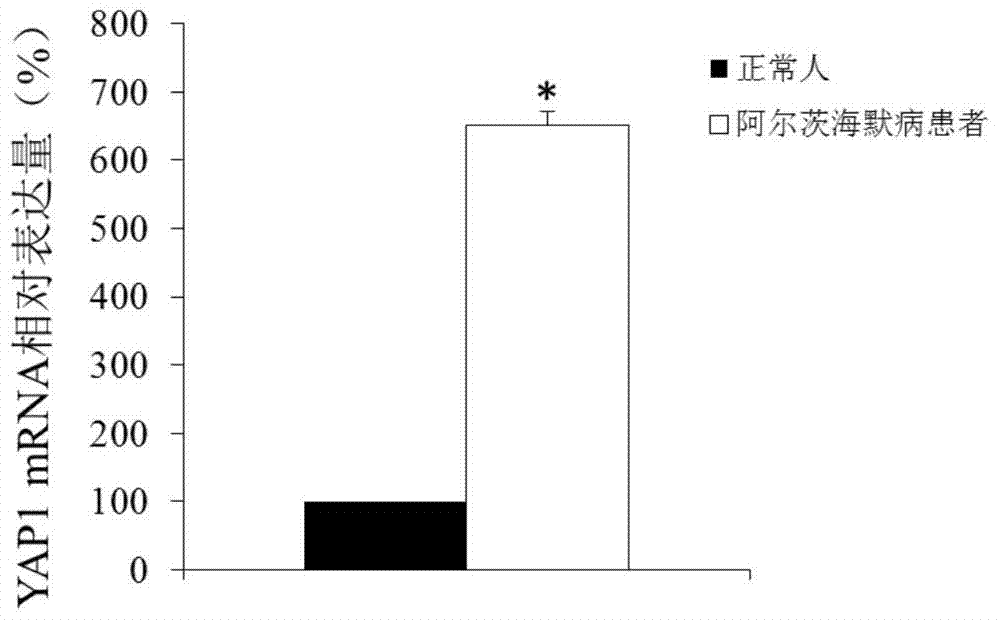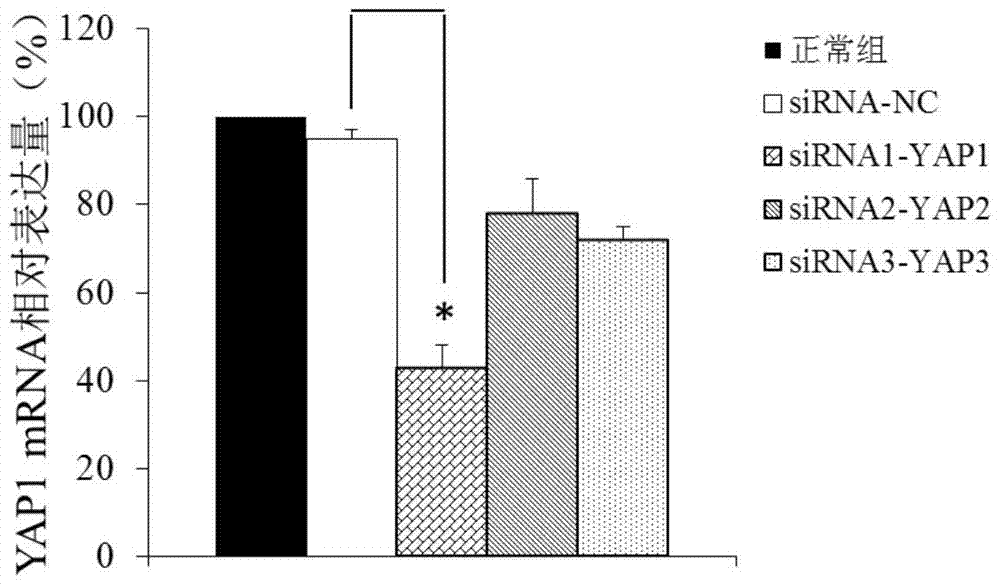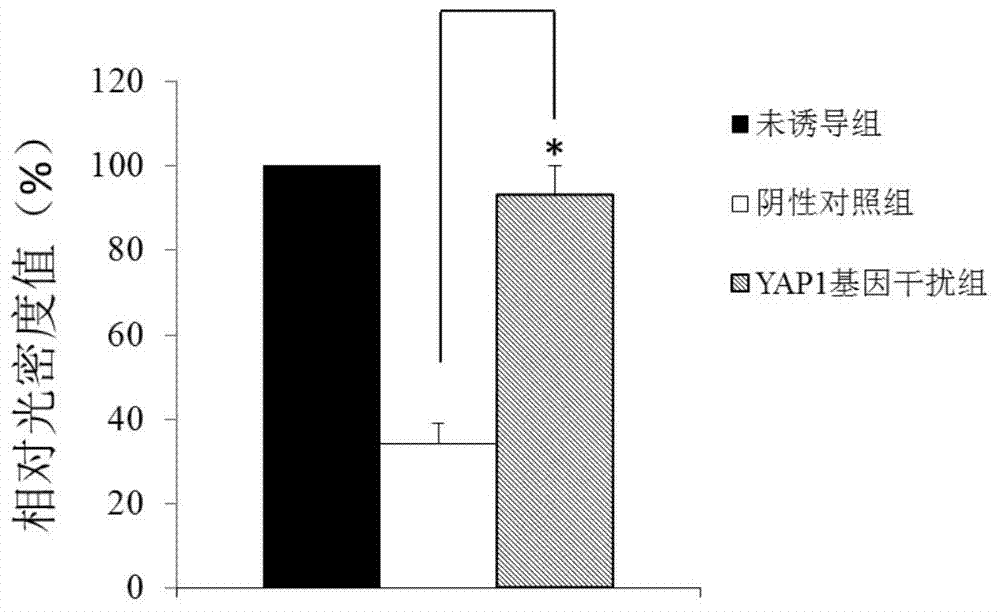Application of yap1 gene in the diagnosis and treatment of Alzheimer's disease
A kind of Alzheimer's disease, gene technology, applied in the treatment, human YAP1 gene in the field of diagnosis of Alzheimer's disease, can solve the problem of inability to organize or reverse the disease progression
- Summary
- Abstract
- Description
- Claims
- Application Information
AI Technical Summary
Problems solved by technology
Method used
Image
Examples
Embodiment 1
[0056] Example 1 Screening for Gene Markers Related to Alzheimer's Disease
[0057] 1. Collection of peripheral blood samples
[0058] AD patients came from Beijing 301 Hospital, a total of 60 cases, aged 53-84 years old, all cases were diagnosed as AD, and its diagnostic criteria refer to the third revised edition of the American Diagnostic and Statistical Manual of Mental Disorders. A total of 50 cases were selected as the control group, selected from the routine physical examination population of Beijing Hospital. All the subjects were excluded from blood lipid metabolism and other diseases, aged 60-82 years. All subjects signed the informed consent for the testing project and provided peripheral blood for genetic testing.
[0059] 2. Total RNA extraction from blood
[0060] Extraction of total RNA from blood using Biotech Blood RNA Extraction Kit
[0061] (1) Take 250 μl (or 0.25 g) of whole blood into an RNase-Free filter column, centrifuge at 13,000 rpm for 2 minutes,...
Embodiment 2
[0091] Embodiment 2 interferes with the expression of YAP1 gene
[0092] 1. siRNA design and synthesis
[0093] siRNA sequence against YAP1:
[0094] siRNA1-YAP1:
[0095] The sense strand is 5'-AUGUGAUUUAAGAAGUAUCUC-3' (SEQ ID NO.7);
[0096] The antisense strand is 5'-GAUACUUCUUAAAUCACAUCG-3' (SEQ ID NO.8),
[0097] siRNA2-YAP1:
[0098] The sense strand is 5'-UUAUAUAGUAAAUUUCUCCAU-3' (SEQ ID NO.9);
[0099] The antisense strand is 5'-GGAGAAAUUUACUAUAUAAAC-3' (SEQ ID NO.10),
[0100] siRNA3-YAP1:
[0101] The sense strand is 5'-UGACAUUUUGGAGAAUUUGCU-3' (SEQ ID NO.11);
[0102] The antisense strand is 5'-CAAAUUCUCCAAAAUGUCAGG-3' (SEQ ID NO.12)
[0103] Negative control siRNA sequence (siRNA-NC):
[0104] The sense strand is 5'-CGUACGCGGAAUACUUCGA-3' (SEQ ID NO.13);
[0105] The antisense strand is 5'-UCGAAGUAUUCCGCGUACG-3' (SEQ ID NO.14).
[0106] Neural cell line R2L1 cells were divided into 1×10 4 Inoculate / well into 24-well cell culture plates at 37°C, 5% CO 2...
Embodiment 3
[0116] Example 3 Antagonistic effect of YAP1 gene on neuronal cell death induced by Aβ
[0117] 1. Cell transfection: according to the method in Example 2, the neural cell line R2L1 was transfected with siRNA1-YAP1 and siRNA-NC.
[0118] 2. After 24 hours of transfection, the neural cell line R2L1 was cultured in a 96-well plate with a cell density of 0.5×10 4 cells / well. Divide the cells into the following groups:
[0119] Uninduced group: transfected with siRNA-NC, without adding 20 μM Aβ42;
[0120] Negative control group (siRNA-NC+Aβ42): siRNA-NC was transfected, and 20 μM Aβ42 was added to the medium;
[0121] YAP1 gene interference group (siRNA-YAP1+Aβ42): transfect siRNA-YAP1, and add 20 μM Aβ42 to the medium;
[0122] Three replicate holes were set up for each group. After incubation at 37° C. for 20 h, MTT was added and incubated for 4 h. After adding the dissolving solution, incubate at 37°C for another 12h, and read the optical density value at 600nm. The hig...
PUM
 Login to View More
Login to View More Abstract
Description
Claims
Application Information
 Login to View More
Login to View More - R&D
- Intellectual Property
- Life Sciences
- Materials
- Tech Scout
- Unparalleled Data Quality
- Higher Quality Content
- 60% Fewer Hallucinations
Browse by: Latest US Patents, China's latest patents, Technical Efficacy Thesaurus, Application Domain, Technology Topic, Popular Technical Reports.
© 2025 PatSnap. All rights reserved.Legal|Privacy policy|Modern Slavery Act Transparency Statement|Sitemap|About US| Contact US: help@patsnap.com



